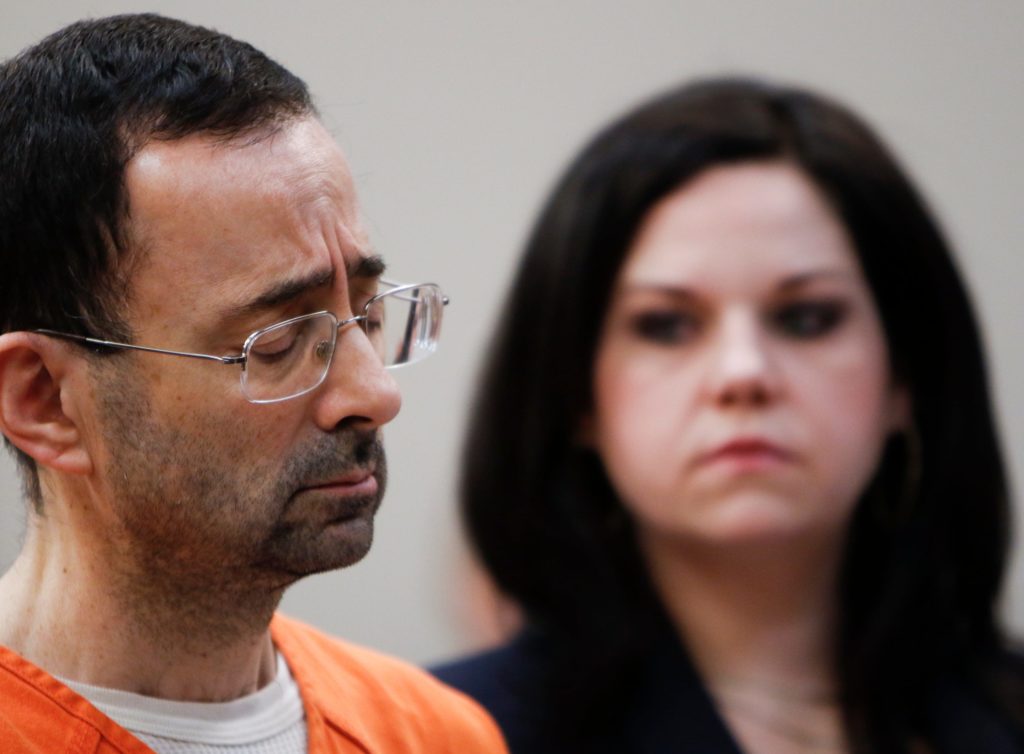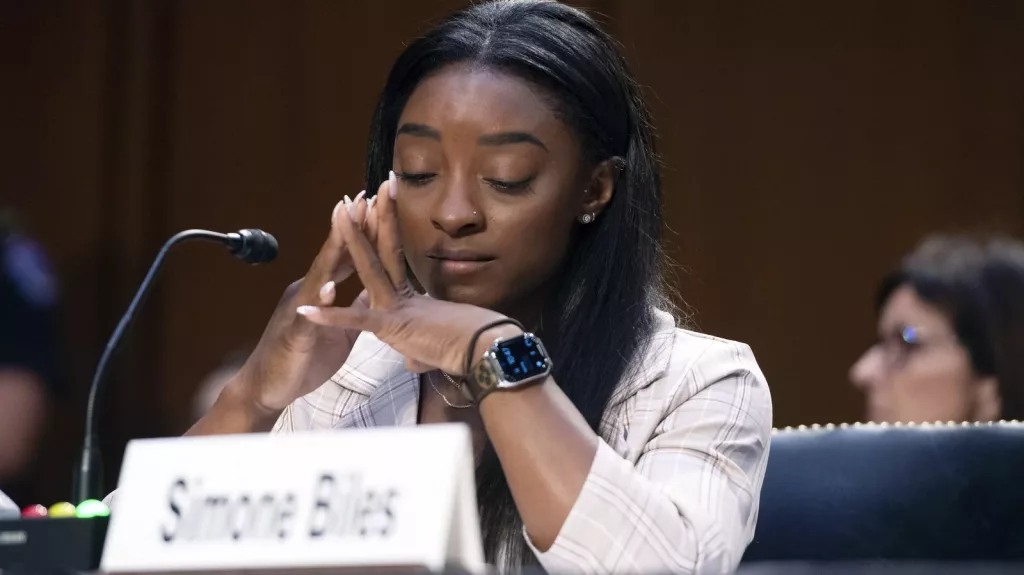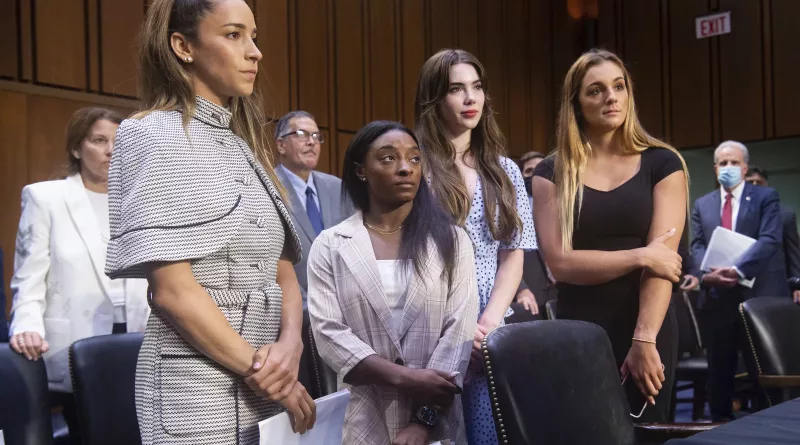US gymnasts address the Senate in ongoing Larry Nassar case
Gymnasts (from left) Aly Raisman, Simone Biles, McKayla Maroney and Maggie Nichols leave after testifying Wednesday at a Senate Judiciary Committee hearing on the FBI’s handling of the Larry Nassar investigation. Photo courtesy of Saul Loeb/Pool, AP.
Jamie Blodgett | Contributing Writer
TRIGGER WARNING: the following content contains subject matter including sexual abuse. If you or anyone you know is experiencing sexual abuse, assault or harassment please consider the following on and off campus sources:
- National Sexual Assault Hotline: 800-656-HOPE
- The Brook Center: 937-229-1217
- UD Department of Public Safety: 937-229-2121
- Dayton City Police Department: 937-333-2677
- Health Center: 937-229-3131 (Note: only doctors are a confidential source)
- RAINN, which is confidential: 800-656-4673
- Montgomery County Prosecutor’s 24-hour sexual assault hotline, which is confidential: 937-225-5623
- Women’s Center, located on campus: 937-229-5390
Five years after the initial charges in 2016 of federal child pornography and sexual abuse of U.S. Gymnasts, a Senate Judiciary Committee hearing was held on Sept. 15 to hear the testimonies of Aly Raisman, Simone Biles, Mckayla Maroney and Maggie Nichols. Such testimonies were in relation to address how the FBI handled the investigation into Nassar during what would become the biggest case of sexual abuse to date in American sports.
Nassar spent eighteen years as a doctor for gymnasts, featuring in four Olympic games, as well as a staff member at Michigan State University. The beginning of Nassar’s career ending journey began in the summer of 2016. A survivor of Nassar’s abuse, Rachael Denhollander, had read the story that had been published on Nassar regarding a fellow gymnast accusing him of abuse. Denhollander had been abused at the age of 15 in high school, and now 16 years later, she knew that it was time for her to come forward as well, so she sent in a tip to the Indianapolis Star.
Following Denhollander came Jessica Howard and Jamie Dantzscher, a 2000 U.S Olympic team member, and by Sept. 12, 2016, Denhollander was finally able to come out with her story.
The outcome of this story began a domino effect that brought more individuals forward in relation to the Nassar case. It was later to be found that concerns of Nassar started as early as 1997, the same year he became the MSU team physician. 2004 began the charges of child pornography position in accordance with the 2016 federal indictment.
Then, following the staggering number of complaints filed against Nassar, MSU cleared him in 2014, but August of 2016 brought Nassar’s past to light yet again when an investigation published by the Indianapolis Star and a criminal complaint by Denhollander was seen by the public. This resulted in Nassar being fired by MSU that same year.
Continuing into September, another Olympic gymnast announced sexual abuse for six years at the hands of Nassar. Oct. 2016 was the beginning of investigations into Nassar as MSU began going through accusations nearly two years after the first one was published. Nassar was given three counts of first degree criminal sexual conduct with a person under 13 in November, pleaded not guilty, and was released on a bond set at $1 million.
Then, in December, 37,000 images and videos of child pornography were found in Nassar’s home during a search conducted by the FBI.

Yet, the end was far from over. The reports of sexual abuse grew substantially during the month of January in 2017, leading to February were MSU gymnastics coach Kathie Klages was suspended. Her suspension came after it was found that a sexual assault claim against Nassar was discouraged at her hands during the late 1990s. Klages retired later that month. In April, Nassar’s medical license was revoked for three years, requiring him to pay $100,000 before applying again in the future.
In June the number of lawsuits against Nassar had risen to 119.
The Nassar case then got major heat by the media in Oct. 2017 after three members of the ‘Fierce Five’ 2012 Olympic team announced their abuse at the hands of Nassar. Maroney led the charge in a twitter post, followed by Raisman in a “60 Minute” interview, and finally Gabby Douglas in an Instagram post.
The first success in the case came in Nov. 2017 when Nassar pleaded guilty to seven counts of first degree sexual criminal conduct, resulting in 25 to 40 prison years carrying a maximum life sentence. Followed with being charged 60 years in federal prison with child pornography charges that December. Then, in January of 2018 Nassar was further charged with 40-175 years on charges regarding sexual assault. Over a seven-day period, 156 women testified against Nassar.
Biles joined the list of individuals who suffered sexual abuse at the hands of Nassar. Then, finally, in February, Nassar was charged with his final criminal case charges of 40 to 125 additional years.
Everything seemed to take a stalemate until earlier this month, Sept. 15, when four elite gymnasts, Raisman, Biles, Nichols, and Maroney addressed the Senate in relation to the handling of the Nassar case at the hand of the FBI.
In a nearly five-hour long hearing, the survivors, as well as multiple members of senate read statements addressing the handling of the above Nassar case. Senator Richard Blumenthal stated, “Let me just come right to the reason we’re here today, it’s not only that the FBI failed to do its job systematically and repeatedly, it is also the coverup… when FBI agents made… false statements.”
He continued by noting that the Department of Justice was invited to the hearing but declined to come. The hearing was centered around the failings of institutions who neglected to help these athletes during Nassars abuse including MSU, USA gymnastics, the coaches, and trainers, USA Olympic committee, USA Paralympic committee and the FBI all of whom looked the other way.
Hon. Jerry Moran led his statement by recalling a time when a survivor questioned him as to “why there was more than one” of individuals abused at the hands of Nassar. Moran did not know how to answer that, and now he wondered how the FBI could deal with the fact that they themselves were on the list of those responsible for allowing there to be “more than one, more than dozens.” The FBI was given warnings of the abuse years ahead of Nassar’s arrest by a survivor. Moran reflects on this by saying “the FBI failed our athletes.”
Following Moran’s statement, Chairman Mr. Durbin introduced survivors Biles (2x Olympian), Raisman (2x Olympian), Maroney (Fierce Five member), and Nichols (2015 worlds team member).

Biles began. In capturing the attention of many throughout the world, Biles noted, “I believe without a doubt that the circumstances that led to my abuse and allowed it to continue are directly the result of the fact that the organizations created by congress to oversee and protect me as an athlete, USA gymnastics, and the United States Olympic and Paralympic committee failed to do their jobs…to be clear I blame Larry Nassar and I also blame an entire system that enabled and perpetrated his abuse.”
Biles captured the senate’s attention by furthering her statement by saying “questions of responsibility and organizational failures remain unanswered, as you pursue the answers to those questions, I ask that your work be guided by the same question that Racheal Dinhollender and many others have asked, how Much is a little girl worth?”
Biles was joined by Maroney. Maroney reported her abuse to the FBI in 2015, but it wasn’t until 17 months later when her report was documented, and as it turns out, severely falsified. Maroney noted her three-hour phone call with the FBI recalling her trauma, and having it minimized and disregarded by the agent on the other end of the call. She recalled feeling as though “her abuse wasn’t enough, and they wanted to cover it up.” She prompted the senate with the question, “If they are not going to protect me, who are they trying to protect?”
Maroney was followed by Nichols. Nichols reported her abuse in the summer of 2015 to the USAG leadership. Nichols recalled “sacrificing her childhood for the chance to compete for the United States.” From the moment of her abuse report, USAG treated Nichols differently.
Raisman took the stand next. Raisman began by mentioning, “Over the past few years it has become painfully clear how a survivor’s healing is affected by the handling of their abuse, and it disgusts me that we are still fighting for the most basic answers and accountability… six years later.”
After the testimonies, the Senate had the opportunity to offer up questions to the four elite gymnasts. The Senate spoke of Safe Sport, a nonprofit created to address sexual abuse in regard to amateur athletes as of 2017. They then asked the athletes what real justice would look like. Raisman took a leadership role in answering the questions in prompting the senate to do a thorough investigation of the FBI, United States of America Gymnastics, and United States Olympic and Paralympic Committee. Raisman also asked that the Senate revamp Safe Sport and noted that Safe Sport should be separate from any committee that a complaint could be filed against.
The full Senate hearing can be viewed here.
For more local & U.S. news like Flyer News on Facebook and follow us on Twitter (@FlyerNews) and Instagram (@flyernews).

